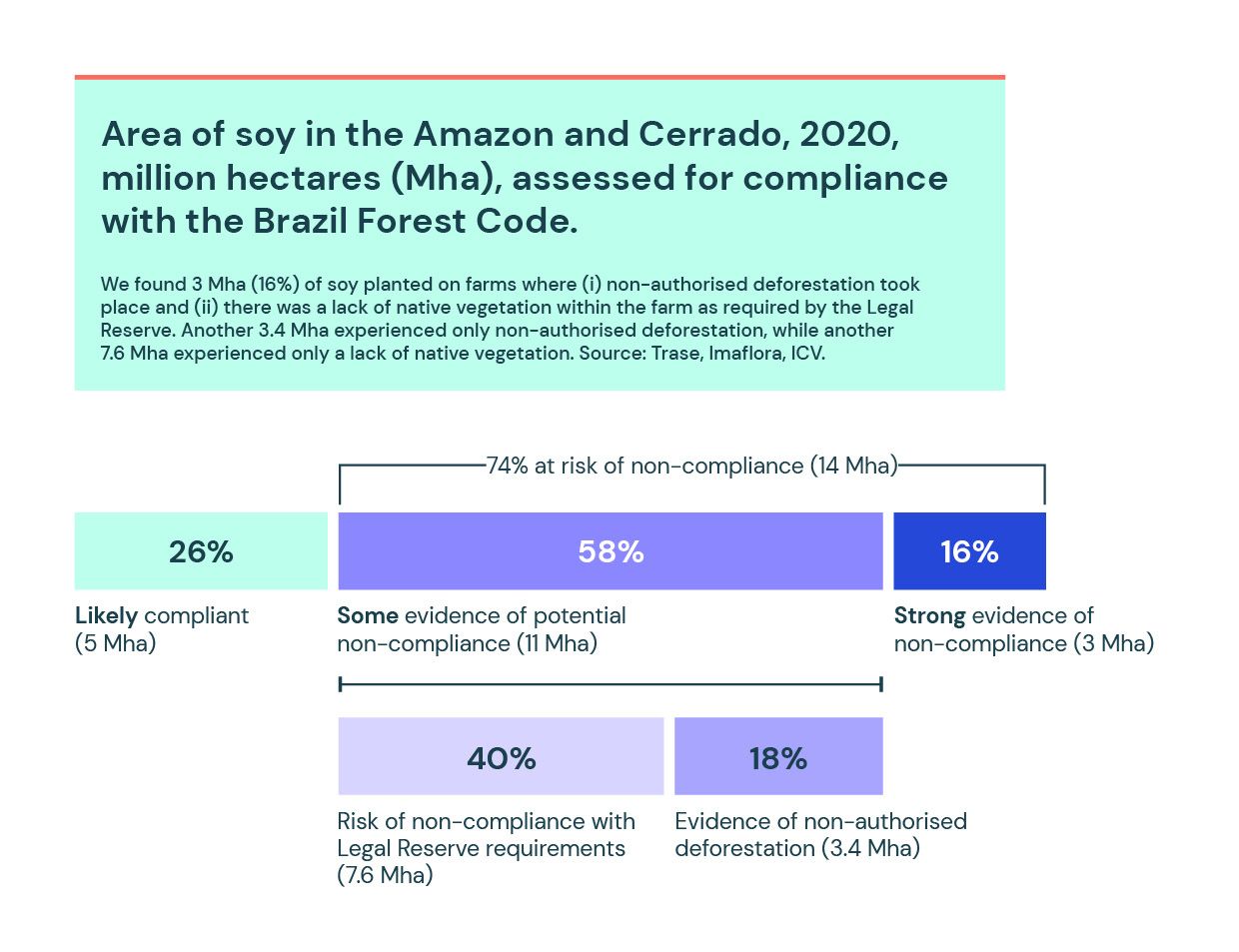Doubts over legal compliance put Brazil’s soy exports to the EU at risk
Traders will struggle to prove that soy from Brazil complies with its environmental laws due to gaps in official data, potentially reducing sales to the EU, according to a report by Trase and Instituto Centro de Vida (ICV).

lourencolf/Shutterstock
The report assesses compliance of soy production in the Amazon and Cerrado with key elements of Brazil’s Forest Code, which sets legal requirements for sustainable land use on farms. From 2025, the EU deforestation regulation will require traders to prove that imports of soy and other commodities were not grown on deforested land and that they comply with environmental laws in their countries of origin.
Among many other requirements, the Forest Code establishes that a proportion of rural farms shall be set aside for the protection and sustainable use of natural resources (known as the ‘Legal Reserve’). This proportion varies from 20% to 80% depending on the biome and other factors. Landowners who do not preserve enough native vegetation can rectify their actions and become compliant via different regularisation and compensation mechanisms. As long as these limits are observed, the Forest Code allows some deforestation on private land, provided landowners first obtain a deforestation licence from a competent environmental agency.
The study finds strong evidence that 16% (3 million hectares) of soy production in the Amazon and Cerrado in 2020 was on farms that did not comply with the Forest Code. These farms were linked to both non-authorised deforestation and a lack of native vegetation on the property as required by the Legal Reserve. Most of this soy was exported to China and the EU.
An additional 18% (3.4 Mha) of soy production in these regions was on farms where there was evidence only of non-authorised deforestation, while a further 40% (7.6 Mha) was on farms with only a lack of native vegetation. In total, the report finds evidence of potential non-compliance for 74% (14 Mha) of soy produced in the Amazon and Cerrado in 2020. In contrast, 26% (5 Mha) of soy production was deemed to be compliant (see figure).

Poor availability of official data
The report is based on a comprehensive assessment of official data on deforestation licences for registered farms in all states in the Amazon and Cerrado in 2009–2020. This revealed that many states in these regions still lack publicly accessible information on deforestation licences and on Legal Reserve compensation mechanisms. This information is critical to enable soy buyers, lenders and investors, and regulators in importing markets to systematically verify compliance.
“Official data on deforestation licensing and regularisation mechanisms could help clarify whether these farms were compliant, but that data isn’t available,” said André Vasconcelos, Global Engagement Lead at Trase. “That will become a problem for buyers or regulators who want to check that their soy imports comply with all relevant laws.”
A poll taken at the report launch found that 60% of participants assumed it would be harder for businesses to demonstrate compliance with the EU regulation’s deforestation-free imports requirement than to prove compliance with environmental laws in producer countries. In reality, the report suggests that the opposite will be the case.
“Most soy from the Cerrado and Amazon, 74%, would have trouble with this legality requirement,” Vasconcelos said. “But at the same time, over 95% of the soy is deforestation-free. So these problems with verification are creating a missed opportunity for Brazil’s soy sector. It’s like selling a car which is emissions-free, but which fails basic safety checks.”
Improving implementation of the Forest Code
Ana Paula Valdiones, Environmental Transparency Coordinator at ICV, said: “Brazil and the EU have an opportunity to collaborate to strengthen the implementation of Brazil’s Forest Code, which is crucial to the shared goal of environmental conservation.”
The report recommends that the Brazilian government should strengthen and enforce the full implementation of the Forest Code, as well as ensure public availability of deforestation licences and of Legal Reserve compensation mechanisms. It should allocate more resources to investigate farms where there is evidence of non-compliance and embargo soy from these farms if the evidence is confirmed. The EU should support Brazil’s full implementation of the Forest Code to enable verification of compliance with the EU deforestation regulation.
It also recommends that all soy trading companies should have effective
mechanisms to monitor whether suppliers comply with national laws, and should request
further information from their suppliers when evidence of non-compliance is detected.
Traders should also suspend sourcing from non-compliant suppliers, and support
programmes for producers to regain compliance. Banks and other financial service
providers should require soy traders to demonstrate that they do not source soy from non-compliant farms in their due diligence processes.
Read the report: Soy and legal compliance in Brazil: Risks and opportunities under the EU deforestation regulation
Leia o relatório em português: Soja e conformidade legal no Brasil: Riscos e oportunidades no âmbito do Regulamento da UE sobre o esmatamento
Watch the webinar: Is this soy legal? Assessing compliance with Brazil’s Forest Code and implications for the EUDR
Listen to the webinar as a podcast: Is this soy legal? The Global Canopy podcast
Was this article useful?




